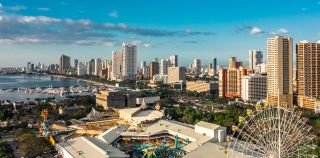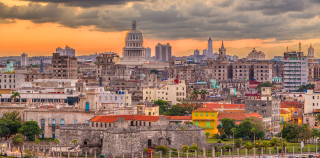- You must have a visa and a valid passport to visit India.
- Although travel insurance isn’t required, it’s advisable to at least purchase travel medical and medical evacuation coverage because India won’t accept your U.S. health insurance.
- More comprehensive policies can also cover other travel mishaps, such as trip cancellations and delays, lost baggage and car rentals.
- According to our research, our top picks for travel insurance for India come from Seven Corners, Tin Leg, and AXA Assistance USA (skip ahead to view these plans).
- Costs for travel insurance vary, but you can typically find basic medical coverage for less than $1 per day.
- To view multiple plans at once and find the best coverage to suit your needs, try using an online comparison tool.
On This Page
- Key takeaways
- Do I need travel insurance to visit India?
- How much does travel insurance for India cost?
- What does travel insurance for India cover?
- What isn’t covered by travel insurance for India?
- Tips for getting the best India travel insurance
- India travel information & requirements
- FAQ: India travel insurance
- Related topics
On This Page
- Key takeaways
- Do I need travel insurance to visit India?
- How much does travel insurance for India cost?
- What does travel insurance for India cover?
- What isn’t covered by travel insurance for India?
- Tips for getting the best India travel insurance
- India travel information & requirements
- FAQ: India travel insurance
- Related topics
Travel Insurance for India: U.S. Visitor Requirements & Quotes
Our top picks for the best india travel insurance
Our top picks for travel insurance for India
Seven Corners
Tin Leg
AXA Assistance USA
Do I need travel insurance to visit India?
India does not require tourists to have travel insurance. However, traveling in India can come with a significant amount of risk. A travel insurance policy covers medical care and medical evacuation, so you can move around the country with peace of mind. If you become injured or sick, you won’t be saddled with an expensive medical bill.
Travel insurance also protects you from other unexpected circumstances that could affect your trip. If a natural disaster forces you to cancel or a political protest disrupts your plans, your policy can help reduce the financial impact.
It can also help you prepare for other risks, such as those discussed below.
Risk of pickpockets and tourist scams
Pickpockets and petty thieves run rampant in India, often targeting unsuspecting tourists. They operate in crowded tourist destinations, such as airports and famous sites like the Taj Mahal.
Tourist scams are another common occurrence in India. Scammers try to lure travelers with false promises, only to extort them for money or put them in dangerous situations. In other cases, criminals drug visitors before robbing them. Travel insurance with coverage for personal items can help pay to replace stolen items.
Risk of canceled day trips or tours
Tours and day trips are a popular way to see sights in India. Since many operators have little to no oversight, they may cancel these excursions at the last minute without reimbursing you. Certain travel insurance policies can reduce the risk of financial loss by covering nonrefundable costs for interrupted or canceled tours.
Risk of political demonstrations
Political demonstrations in India can be large and disruptive. In some cases, they affect airlines, train lines and major roadways. When a demonstration arises before or during your trip, you may have a hard time reaching your destination. In some cases, widespread protests make it too dangerous for foreigners to visit the affected areas. A travel insurance policy can help you recover the costs of canceling the trip, rebooking flights, or making unexpected hotel stays.
Risk of severe weather conditions
Many parts of India experience severe weather at various times throughout the year. In southern India, the monsoon season often brings severe flooding; the northern part of the country sees intense dust storms. Dangerous heat waves are possible across most of the country. While you can’t predict serious weather events, you can use insurance to prevent significant financial losses if storms affect your trip.
Best Value for Robust Coverage & Medical Emergencies
Seven Corners
Why We Like It
PROS
- Offers coverage for pre-existing conditions
- Money-back guarantee
- Cancellation & Interruption coverage standard
- Covers action sports & equipment
CONS
- Cancel for any reason not included standard
- Must meet waiver for pre-existing conditions to be covered
Best Rated Overall
Tin Leg
Why We Like It
PROS
- Coverage for pre-existing conditions
- Cancelation & interruption coverage
- Offers hurricane and weather coverage
CONS
- Cancel for any reason not included standard
Best for Budget Friendly Travelers
AXA Assistance USA
How much does travel insurance for India cost?
Our official sales figures over the past year show that our customers paid an average of $136.70 for travel insurance to India.
We found that travel insurance for a trip to India can cost as little as $1 per day for the most fundamental medical and medical evacuation coverage. A more comprehensive plan that covers trip cancellations and interruptions will cost around $7 to $11 per day.
To give you a better idea of how much travel insurance costs for a trip to India, we requested quotes from four leading travel insurance providers.
We used these details for all of our quotes:
- Age: 35 years old
- Destination: India
- Trip Length: 7 days
- Trip cost: $2,000
- Date: September 2024
You can see our quotes for basic travel insurance in the table below. Prices range from less than $1 per day to $6 per day.
Example Where Plan Doesn’t Reimburse the Full Trip Cost
| Provider | Plan Name | Plan Cost | Cancellation / Interruption Limits | Medical / Medevac Limits |
|---|---|---|---|---|
| Tin Leg | Standard | $5 | $0 / $0 | $30k / $200k |
| Trawick International | Safe Travels Explorer | $26 | $0 / $0 | $50k / $200k |
| Seven Corners | Trip Protection Basic | $25 | $0 / $1k | $100k / $250k |
| AXA Assistance USA | Silver | $42 | $0 / $500 | $25k / $100k |
Our quotes for policies that include trip cancellation and trip interruption coverage are in the following table. Prices range from around $7 to $11 per day.
Example Where Plan Does Reimburse the Full Trip Cost
| Provider | Plan Name | Plan Cost | Cancellation / Interruption Limits | Medical / Medevac Limits |
|---|---|---|---|---|
| Tin Leg | Standard | $46 | $2k / $3k | $30k / $200k |
| Trawick International | Safe Travels Explorer | $61 | $2k / $2k | $50k / $200k |
| Seven Corners | Trip Protection Basic | $75 | $2k / $2k | $100k / $250k |
| AXA Assistance USA | Silver | $69 | $2k / $2k | $25k / $100k |
It’s important to note that the cost of India travel insurance is different for everyone.
Providers base your policy premium on factors such as:
- Age
- Trip duration
- Cost of the trip
- Current health insurance
- Elapsed time between policy purchase and first trip deposit
What does travel insurance for India cover?
As with any type of insurance, every plan offers different types and levels of coverage.
We break down some of the most common coverage types below.
Trip cancellation insurance
Trip cancellation coverage helps you recover prepaid, nonrefundable trip costs if you have to cancel your plans. Travel to India is expensive, especially if you’re booking popular hotels and tours. If you fall ill a week before your flight and you’re too sick to travel, insurance can ensure that you don’t lose money in the process.
Trip delay insurance
This type of insurance covers the extra expenses that arise if your India trip is held up due to circumstances beyond your control. If your connecting flight from Amsterdam to New Delhi is pushed to the next day, insurance can cover a last-minute hotel booking and taxis to and from the airport. Keep your receipts, and you might also be able to get reimbursed for meals and nonrefundable hotel stays in your final destination.
Trip interruption insurance
Trip interruption coverage kicks in if unexpected circumstances require you to cut your vacation short. As long as the reason for the interruption is covered, the policy will typically refund the non-refundable costs of the rest of the trip. It might also cover the flight back to the U.S.
Travel medical insurance
If you get hurt or fall ill while you’re exploring India — a possibility, given the country’s inconsistent safety regulations — travel medical insurance covers the costs. In most cases, you’ll need to pay the healthcare bills first and file a claim for reimbursement. Some plans will work directly with the medical provider to settle bills if you need hospitalization after an accident or a bout of dengue fever.
Medical evacuation insurance
Medical evacuation coverage pays for your transportation in case of a medical emergency. It’s critical for trips to India — healthcare facilities aren’t always available away from major cities. That means if you’re injured while trekking in the Himalayas or cruising in Kerala, you may need to be transported a long distance by air to get to a hospital. When the situation is serious enough, a medical flight back to the United States may be necessary.
These services are expensive, but evacuation coverage can take care of the bill. Make sure you choose a policy with a high limit when traveling to India, particularly if you’re planning an adventurous itinerary to rural parts of the country.
Insurance for personal items
Personal item coverage helps you pay for damaged, lost or stolen belongings. Given the risk of theft and pickpocketing in India, this type of insurance is essential. Limits can vary considerably between policies; you may need to shop around to find adequate coverage if you’re packing computers, phones and cameras.
Rental car coverage
This type of insurance pays for damage to your rental car. It’s usually offered as an add-on for an extra fee, but don’t skip it if you’re renting a car in India — road conditions and driving safety are well below U.S. standards in many areas.
What isn’t covered by travel insurance for India?
Every travel insurance policy comes with exclusions, which are things the plan will not cover. For example, if your policy excludes preexisting medical conditions, it won’t pay cancellation costs if you have to cancel due to a chronic health condition.
Standard travel insurance exclusions are:
- Pregnancy (except for complications)
- Anxiety and mental health
- Routine medical or dental procedures
- High-risk activities
- Extreme sports and professional sports
- Trips that go against medical advice
- Storms that have already been named
- Illegal activities
It’s also important to note that your policy might refuse to cover anything for which you don’t have the appropriate documentation. If you need to seek medical care, or you plan to file a claim for trip cancellation or interruption, call the provider immediately to ask about documentation requirements.
Tips for getting the best India travel insurance
A wide range of providers offer travel insurance to India.
These tips can help you select a plan that provides ample coverage and peace of mind:
Research your destinations.
If you’re traveling to rural parts of India, make sure your insurance policy includes a high limit for medical evacuation. That way, you’re less likely to incur high bills for medical flights.
Check emergency procedures.
Some providers deny medical claims if you fail to call the emergency assistance line before seeking help. That’s not always possible in areas of India that don’t have cell service.
Consider how you’re traveling around India.
Travel insurance policies don’t apply to every mode of transportation. If your plans include hitching a ride or renting a motorcycle in India, make sure it’s covered in case of an accident.
Examine the risk level of activities.
Read the policy exclusions carefully to ensure that your intended activities are covered.
Buy a policy as soon as possible.
By buying as soon as you book the trip, you’ll be protected for longer. Coverage usually starts from the purchase date.
India travel information & requirements
| Query | Details |
|---|---|
| Is a tourist visa required for U.S. travelers? |
Yes (eVisa available) |
| Allowed length of stay for tourists with eVisa |
Up to 60 days |
| Passport requirements |
Two blank pages; passport must be valid for 6 months from visa application date |
| Local currency | Indian rupee |
| Language | Hindi, English |
| Exchange rate | 1 US dollar = 82.97 Indian rupees |
| Vaccine requirements |
Yellow fever (if you’re coming from sub-Saharan Africa or other areas prone to yellow fever) |
| Covid test required | No |
| Travel advisory level | Level 2: Exercise Increased Caution |
| Emergency services phone number | 100, 112 (from mobile phones) |
| U.S. health insurance accepted | No |
| Travel insurance requirements | None |
Are there COVID-19 restrictions for U.S. tourists?
No, as of February 13, 2023, there are no COVID-19 restrictions for U.S. tourists.
Do I need a visa or passport to travel to India?
You need both a visa and a passport to travel to India. You can apply for an eVisa online. If you’re approved, you can travel in India for up to 60 days. Make sure to apply at least four days before you’re scheduled to arrive. To stay longer, you must apply for a standard tourist visa at the nearest Indian consulate or embassy.
Before you apply, check the expiration date on your passport. The document must be valid for at least six months after the application date. Indian immigration officials require two blank pages to accommodate visas and stamps.
Is it safe to visit India?
India can be a safe destination for savvy tourists — however, you must exercise a great deal of caution. Petty crime is common, as are scams. Female travelers must be especially careful as there have been many reports of sexual assault and violence against women, including tourists. The U.S. Department of State advises women to dress according to local custom and avoid traveling alone in India.
There is also a chance of terrorism and civil unrest throughout India, particularly in the northeastern states, central and eastern India and areas near the Pakistan border.
Can a US citizen buy health insurance in India?
As a citizen of the US traveling to India, it is far more beneficial for you to purchase a travel insurance policy before you leave for your vacation. Doing so prepares you for early unforeseen circumstances such as delayed flights or canceled bookings. NRIs (non-resident Indians) may be able to purchase health insurance in India. Still, as U.S. travel insurance companies are fully regulated, you are far safer securing your coverage within the states.
FAQ: India travel insurance
Can I use my U.S. health insurance in India?
No, you cannot use most standard U.S. health insurance policies in India.
Can a U.S. citizen buy travel insurance in India?
A few insurance providers allow you to purchase travel insurance after you’ve started your trip in India. However, you may be subject to higher fees or a waiting period before you can make a claim.
Is it better to buy travel insurance from India or U.S.A.?
It’s best to buy travel insurance for India while you’re still in the United States. You can buy it from a domestic or international provider — just make sure the company is reputable and that the policy applies to American travelers.






























































